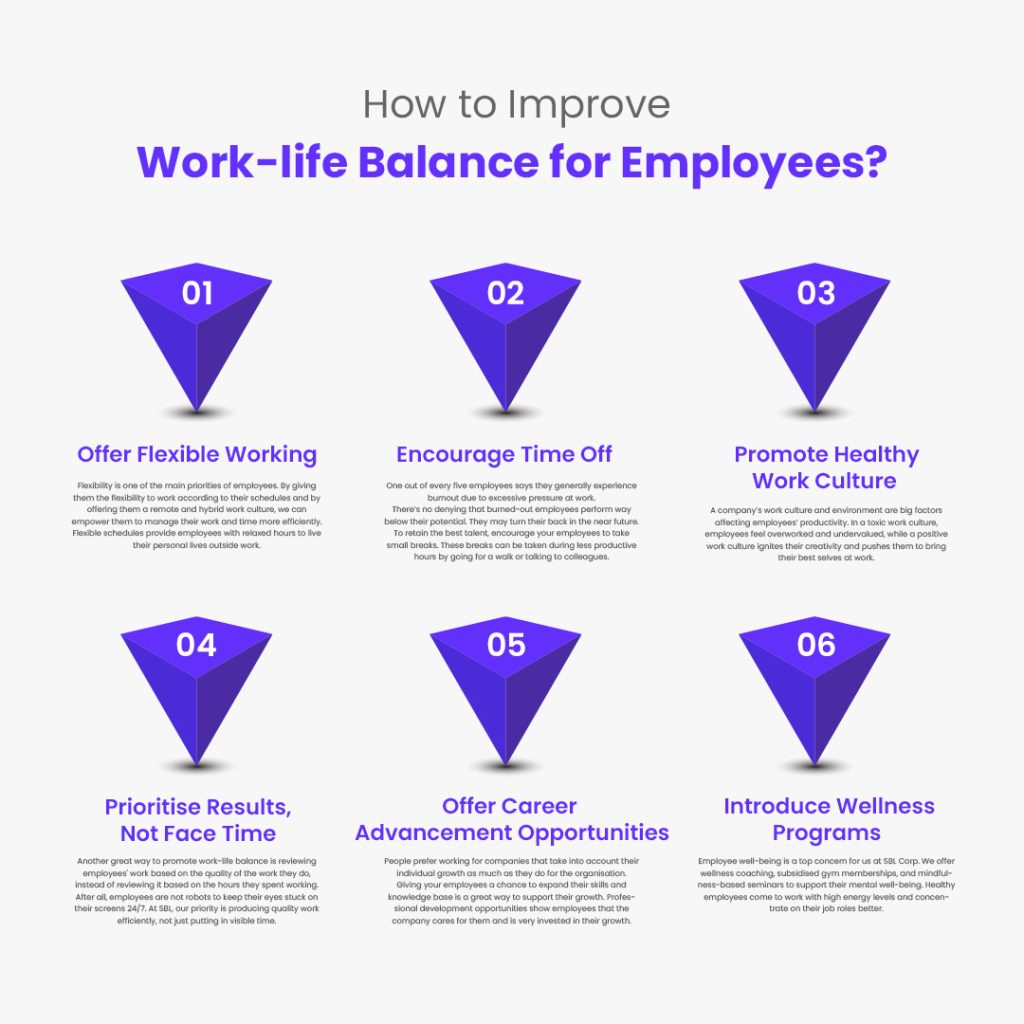
While searching for jobs, all employees desire this same thing. Work life balance!
61% of people don’t prefer jobs that never allow them to manage their personal and professional lives well together. Ever since the pandemic, people’s priorities and preferences for job culture have changed. 72% of employees find work life balance as an essential element to be happy at work. Managers at all levels must promote work life balance for their team members. In this blog post, we will find out 6 best practices to keep employees happy and more engaged at work, and how, as an employer, we can help them balance their work-life well.
What is Work-life Balance?
Employees often make significant personal sacrifices to prove their loyalty at work so much that their personal lives are burdened with unnecessary stress.
At SBL Corp, we understand the vitality of developing work life balance and therefore, respect people’s personal lives and well-being.
Work-life integration simply means balancing personal and professional lives together without letting work affect or reduce our personal time. The balance between the two is essential – to prevent employee burnout and keep stress at bay.
A good work life balance is actually a win-win situation for both employers and employees.
The more healthy, happier, and satisfied we can keep our employees, the better they contribute to our organisation’s growth and development. It happens when people do not think of their work responsibilities as a chore and contribute to building a healthy work culture.
How to Improve Work-life Balance for Employees?
Following are the ways to support employees in integrating work life balance:
Offer Flexible Working
Flexibility is one of the main priorities of employees. By giving them the flexibility to work according to their schedules and by offering them a remote and hybrid work culture, we can empower them to manage their work and time more efficiently.
Flexible schedules provide employees with relaxed hours to live their personal lives outside work.

Encourage Time Off
One out of every five employees says they generally experience burnout due to excessive pressure at work.
There’s no denying that burned-out employees perform way below their potential. They may turn their back in the near future.
To retain the best talent, encourage your employees to take small breaks. These breaks can be taken during less productive hours by going for a walk or talking to colleagues.
Additionally, encourage them to utilise their vacations; it will help them rejuvenate and come back to work with better focus and energy.
Promote Healthy Work Culture
A company’s work culture and environment are big factors affecting employees’ productivity. In a toxic work culture, employees feel overworked and undervalued, while a positive work culture ignites their creativity and pushes them to bring their best selves at work.
A healthy work culture is also beneficial in retaining the best employees as people are far more likely to remain loyal to a company that respects their personal lives and provides a supportive culture.
Prioritise Results, Not Face Time
Another great way to promote work-life balance is reviewing employees’ work based on the quality of the work they do, instead of reviewing it based on the hours they spent working. After all, employees are not robots to keep their eyes stuck on their screens 24/7. At SBL, our priority is producing quality work efficiently, not just putting in visible time.
Offer Career Advancement Opportunities
People prefer working for companies that take into account their individual growth as much as they do for the organisation.
Giving your employees a chance to expand their skills and knowledge base is a great way to support their growth. Professional development opportunities show employees that the company cares for them and is very invested in their growth.
When people feel they are progressing in their careers, they prioritise organisational goals better than before.
Introduce Wellness Programs
Employee well-being is a top concern for us at SBL Corp. We offer wellness coaching, subsidised gym memberships, and mindfulness-based seminars to support their mental well-being. Healthy employees come to work with high energy levels and concentrate on their job roles better.
Conclusion
In a healthier and sustainable work culture, achieving a work life balance is a necessity.
Employees have become more conscious about managing their personal and professional lives together, especially after the COVID-19 pandemic. They prefer jobs that not only offer them flexibility in working hours but also support career growth.
Together, let’s create a positive work culture where taking time off is encouraged, not viewed as a disruption.
Follow me on LinkedIn
Frequently Asked Questions
1. How to balance work life and personal life?
Balancing work life and personal life requires discipline:
A. Set boundaries – Establish clear boundaries between working hours and personal time. Avoid checking emails or taking calls outside of work hours.
B. Take breaks – During the least productive hours, take short breaks and go for walks or perform quick leisure activities to mentally recharge yourself.
C. Use paid time off – Take yearly vacations and fully unplug from work.
2. What are the costs of poor work-life balance?
The costs of poor work-life balance are lower employee productivity, higher turnover rates, and difficulties in retaining top talent.
3. Why is work life balance important?
Work-life balance is crucial to reduce employee burnout, increase productivity, improve employee mental well-being, and promote a positive work culture.
Employees prefer working with companies that help them integrate a balance between their professional and personal lives.
4. How to promote work-life balance for employees?
Some ways to promote work-life balance for employees are as follows:
A. Offer Flexible Work Arrangements: Flexibility to work remotely provides employees more control over integrating work and personal life.
B. Avoid After-Hours Expectations: Discourage late-night emails and calls. Always respect set work schedules.
C. Measure and Appreciate Employees: Recognise and appreciate employees who exemplify healthy work-life integration. It is a good way to show employees respect for their work and contributions to your company.



